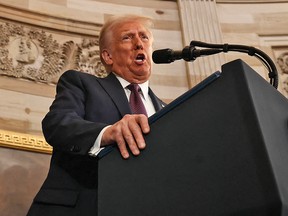The term was coined in the mid-1800s but the idea behind it existed well before that

In his inaugural address, President Donald Trump said the United States would be a nation that “expands its territory” and referenced the pursuit of “Manifest Destiny into the stars,” vowing to land American astronauts on Mars.
There are a few things happening in that statement.
The first, obviously, is the notice of expanding U.S. territory. In recent weeks, Trump has threatened to acquire Canada by “economic force,” and repeatedly referred to the U.S.’s northern neighbour as the 51st state. He has also mused about acquiring Greenland and suggested the takeover of the Panama Canal.
The second is the announcement of a mission to Mars.
The third is the use of the term Manifest Destiny, a term that has significance in both American and Canadian political culture.
What is the origin of Manifest Destiny?
Later, writing in the New York Morning News, amidst the United States’ dispute with Britain over Oregon County, which at the time included huge swaths of the northwestern coast of the continent, O’Sullivan wrote that the Americans’ claim to the territory was “by the right of our manifest destiny to overspread and to possess the whole of the continent which Providence has given us for the development of the great experiment of liberty and federated self-government entrusted to us.”
The other potential author is Jane Cazneau, a journalist who advocated for the wholesale annexation of Mexico during the Mexican-American War between 1846 and 1848.
However, the idea of Manifest Destiny existed well before it was put into writing with that explicit term.
What does it mean?
Simply put, it means that North America comes under the dominion of the United States. This was actually viewed as inevitable by a number of thinkers on both sides of the border.
“There is no sane man who does not admit the inevitability of our merger with the United States,” said Quebec journalist Louis-Antoine Dessaulles in a speech, according to an 1851 collection of lectures.
William Earl Weeks, an American historian, writes in his book, John Quincy Adams and American Global Empire, that there are three crucial components of Manifest Destiny, in all its forms: “The assumption of the unique moral virtue of the United States, the assertion of its mission to redeem the world by the spread of republican government and more generally the ‘American way of life,’ and the faith in the nation’s divinely ordained destiny to succeed in this mission.”
Was it ever taken seriously by those in power?
Yes. John Quincy Adams, the sixth president of the United States, was an ardent believer for a time in the divine mission to spread the republic across the continent. Adams served in the 1820s — well before the term Manifest Destiny was coined.
European powers, Adams wrote, must be “familiarized with the idea of considering our proper dominion to be the continent of North America.”
Ironically, by the time the Mexican-American war came around, Adams was a staunch opponent of U.S. expansionism, essentially because it, at least in the case of Texas, led to the expansion of slavery.
In the 1844 presidential faceoff, James Polk, the Democratic candidate, defeated Henry Clay, the Whig candidate, at least in part because of his bullishness on the American empire. The election revolved around issues of Texas (and slavery) and the boundary dispute with the British Empire in the Pacific northwest.
In that case, the idea that America must control the continent led to the pitch that the U.S. border should be 40 minutes north of the 54th parallel — giving the U.S. control of all of what’s now coastal British Columbia. “Fifty-four forty or fight” became a slogan during the time of Polk’s run and presidency.
All that said, historians don’t think it ever had that much popular support.
The idea of expansion had consequences though, right?
Certainly. Chief among them is that it dispossessed Native Americans of their land as settlers moved west under the Homestead Act. The purchase of Alaska could be seen as a part of Manifest Destiny, as could American territorialism in the Philippines and the tenets of the Monroe Doctrine that, to this day, still show up in South American politics.
So why doesn’t the U.S. control all of North America?
There are a bunch of reasons, not least of them is that the United States more or less gets what it wants from Canada without having had to invade or go through the process of annexation.
However, Manifest Destiny wasn’t ever really a wildly popular idea. In fact, Abraham Lincoln and Ulysses S. Grant both opposed American expansionism. And it doesn’t seem to have ever really caught on among Americans, although that era doesn’t give us polling data to make the case.
“From the outset, Manifest Destiny — vast in program, in its sense of continentalism — was slight in support,” writes historian Frederick Merk. “It lacked national, sectional or party following commensurate with its bigness.”
Indeed, in the case of the Oregon treaty, which established the border between the U.S. and the land that would become Canada at the 49th parallel, only 14 out of 55 U.S. senators held out for that 54-40 upper boundary.
Does it exist today?
Clearly, to some extent, it does, at least in the way that Trump is talking about it.
However, in recent decades, it has been far more metaphorical, hearkening back to the idea of 17th-century Puritan John Winthrop, who spoke about America as a “shining city on the hill,” an example to the rest of the world.
Ronald Reagan repeatedly invoked Winthrop. So, too, has Barack Obama. The echoes of American exceptionalism, that it is a respected nation, one at the vanguard of progress and prosperity, is still very much a part of U.S. politics.
Our website is the place for the latest breaking news, exclusive scoops, longreads and provocative commentary. Please bookmark nationalpost.com and sign up for our newsletters here.